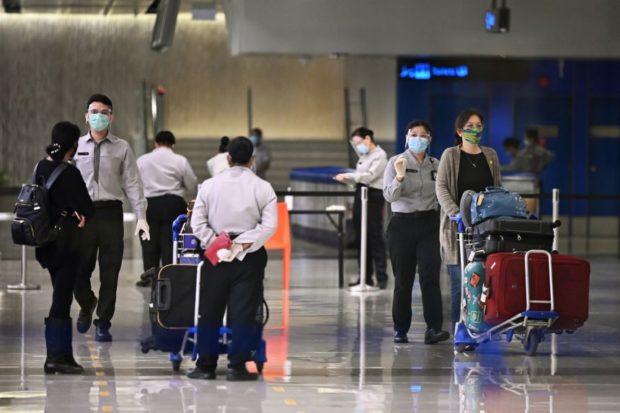
Those using the lane will be transported from the airport to dedicated facilities where they will stay and work. The Straits Times/Asia News Network
SINGAPORE — From the second half of January 2021, short-term business travelers from all countries arriving in Singapore will no longer need to be quarantined, under new segregated travel lane arrangements.
The Ministry of Trade and Industry said on Tuesday (Dec 15) that those who opt to use the lane will be transported from the airport to dedicated facilities where they will stay and work.
There, they can have meetings through floor-to-ceiling air-tight glass panels with local businessmen, as well as with other foreign businessmen with safe distancing measures in place.
Regular testing will be conducted throughout the duration of their stay – for instance on alternate days – in addition to tests before departure from their home countries and upon arrival here.
They will also have to move within their pre-declared travel group of up to five people to reduce the risk of mass transmission.
The segregated travel lane is distinct from existing reciprocal green lane arrangements, which apply only to selected countries but which allow those on essential business here to move about more freely around Singapore.
The segregated travel lane restricts movement, but lets in business, official and high economic value travelers from all countries, as long as their stay is 14 days or shorter.
The lane is expected to increase traffic at Changi Airport, where about 15 percent of travelers pre-Covid-19 entered the country for business-related reasons.
It should also have knock-on effects on the hospitality sector, which could cater food and provide accommodation for the travelers once they are given approval.
Trade and Industry Minister Chan Chun Sing, on a tour of Connect @ Changi, one of the facilities that will be used to house travelers in the segregated travel lane, said the new measures will make Singapore more relevant as a business hub amid the unpredictability of Covid-19.
“Global business travel has been severely affected by the need for quarantine measures…Different countries will continue to have different risk profiles and we should not let this hinder business meetings,” he said.
“Dedicated facilities can allow Singaporeans to meet (business) travelers from elsewhere. They can also allow (business) travelers from elsewhere to meet each other.”
Based on patterns established last year, roughly nine in 10 of business travelers to Singapore stayed in the country for five days or fewer, hinting at the demand for such expedited, business-specific travel arrangements.
A huge chunk of these are currently not covered by reciprocal green lane arrangements, and have to undergo quarantine before being able to meet their local partners face to face.
Temasek senior managing director Alan Thompson, who was among those helming the Connect @ Changi project, said local employees of multinational companies might not have had a chance to meet their regional heads in person for more than year.
Facilities like Connect @ Changi, which will take in its first guests in February next year , provide businessmen with the opportunity while minimizing physical contact.
Connect @ Changi is a four-star facility currently being built at Singapore Expo & Max Atria, within a five-minute drive from Changi Airport.
When fully constructed in mid-2021, more than 1,300 guest rooms and about 340 meeting rooms will be available for booking, with each night costing travelers between $400 to $480.
Meeting rooms can fit between four and 22 people, and are meant for meetings rather than larger-scale conferences or events.
Mr Wong Heang Fine, group chief executive officer of Surbana Jurong, which built Connect @ Changi, said the facility can be quickly repurposed within weeks for other uses post-Covid-19 as it is constructed from pre-fab modules.
Connect @ Changi said the facility will create 800 jobs in Singapore in construction and the maintenance and provision of services within the facility.
Mr Chan said MTI will study the demand for the segregated travel lane to assess the number of dedicated facilities needed, and could broaden the use of the lane for medical or family visiting uses.
Facility operators interested in serving as a segregated facility can submit their proposals through the Singapore Tourism Board (STB) by the end of the year.

